Current Research
Campus Climate Survey: Surveys are sent out to students, staff, and faculty at The University of Tulsa. Topics on the survey include sexual violence, intimate partner violence, emotional abuse, general campus climate, and drug/alcohol use. Anyone interested in getting involved can email davis.traumalab@gmail.com
Glass Blowing Project: The TACTS lab is involved in a partnership with Tulsa Glassblowing school. The project is collecting outcome data from the school’s veterans’ program to help with grant applications. Anyone interested in joining the glassblowing project can email Amanda at agg5225@utulsa.edu.
Pediatric Sleep Assessment Study: This project has developed and is evaluating a structured clinical interview for DSM-5 sleep disorders in pediatric populations, the SCISD-Kid. For more information, you can email Mollie at mer597@utulsa.edu.
Sexual Assault Kit Initiative (SAKI): Dr. Davis and an undergraduate research assistant will assist the Tulsa Police Department’s Special Victims’ Unit [TPDSVU] in the development of a database to collect information from sexual assault kits and related cases and will analyze the data to answer questions put forth by the grant team. If you are interested in getting involved, please contact TITAN coordinator at admin-titan@utulsa.edu
SPARTA LAB CBT-NC: We are currently recruiting participants for a nightmare treatment study. This randomized clinical trial evaluates the treatment’s effectiveness for idiopathic and trauma-related nightmares in children aged 6-17. CBT-NC is a collaboration between TITAN and OU School of Community Medicine. If you are interested in getting involved with the study, please contact Lauren at lep0204@utulsa.edu.
TACTS lab/Dart lab: Several studies related to the occupational health of journalists are ongoing including several studies in other countries. We are also creating a series of studies about the impact of trauma coverage of news audiences for undergraduate students to engage in so that within a year of lab engagement they can fully engage in running, writing up, and planning a study. Anyone interested in the lab must be available from 11 am –12 pm on Mondays. Anyone interested in getting involved can email agg5225@utulsa.edu
Time to Report Rape in the Community Survey: Using police report data, we are looking at sexual violence which has been reported in the Tulsa area. It will also help us better understand the amount of time it takes for victims to report an assault. Anyone interested in getting involved can email mdr3347@utulsa.edu.
TRAPT Lab Nightmare Trials: We are currently recruiting participants for three randomized clinical trials. Our trials are studying the effectiveness of Exposure, Relaxation, Rescripting Therapy (ERRT) for adults who suffer from trauma-related nightmares. We are also examining the relative efficacy of ERRT to other forms of treatment for PTSD and insomnia on outcomes such as nightmares, suicidal ideation, PTSD symptoms, and other symptoms. Anyone interested in getting involved can email tu.nightmarestudy@utulsa.edu
Role of Place-Based Learning in Empathy Development: This project in the scholarship of teaching and learning is a pilot study collecting quasi-experimental data from two sections of an introductory sociology course to determine the effects of place-based learning on empathy development (Rachel Head, Ph.D. rachel-head@utulsa.edu).
**Research projects page updated 02/19/2022**
Research in Action

Undergraduate student, Shianne Andrew, presenting a TITAN poster at the 34th Annual ISTSS Meeting in Washington D.C.
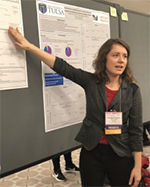
Doctoral student, Merdijana Kovacevic, presenting a TITAN poster at the 34th Annual ISTSS Meeting in Washington D.C.
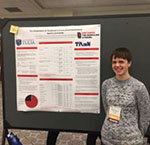
Doctoral student, Autumn Slaughter, presenting a TITAN poster at the 34th Annual ISTSS Meeting in Washington D.C.
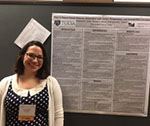
Undergraduate student, Hannah Cole, presenting a TITAN poster at the 23rd Annual ISTSS Meeting in Chicago, Illinois.

Doctoral student, Mollie Rischard, presenting a TITAN Poster at the 33rd Annual ISTSS Meeting in Chicago, Illinois.
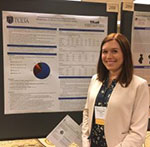
Doctoral student, Chelsea Shotwell-Tabke, presenting a TITAN poster at the 33rd Annual ISTSS Meeting in Chicago, Illinois.
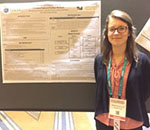
Doctoral student, Merdijana Kovacevic, presenting a poster at the ABCT conference in San Diego, California.

Doctoral students, Anushka Patel and Merdijana Kovacevic with other discussants presenting a symposium at the ABCT Conference in San Diego, California.
Past Research
SHAPE Project: This project’s purpose was to assess the mental health profile of TU student-athletes and examine the impact of mental health indicators on various indices of functioning. Data collection is complete. SHAPE continues as a service project to athletics. Anyone interested in getting involved can email Jack at jrs3194@utulsa.edu
Greenwood Programming: TITAN is in discussions with others regarding programming for Greenwood Rising (https://www.tulsa2021.org/rising) the new history center in Greenwood, under construction and due to open late 2021. All the programming would naturally look through the lens of race, racial violence, racial inequities. We have some excellent faculty at TU who are already doing a lot of this work and would love to contribute programming ideas. This is programming that is meant to appeal to a national audience, attract media, possibly bring people to town. As an example, one of the initiatives we know we are pursuing is an art biennial fashioned after the Greenwood Art Project that is scheduled for the Centennial and will surely have a national/international scope.
Strength at Home Program: Project is in the early stage of investigating utilizing the Strength at Home program in the Native American population. If there is interest from the tribes, we will submit a grant proposal to the National Institute of Health Disparities. The program is a 12-week, cognitive-behavioral, trauma-informed group therapy program for individuals who have engaged in recent physical intimate partner violence (IPV). The program addresses social information-processing deficits presumed to increase the risk of IPV. Dr. Taft and the research team are interested in expanding the program beyond military, with another community to implement the program, taking into account generational trauma. Tribal health data indicates the incidence of IPV may be overrepresented in different American Indian tribes. Project went on hold due to COVID-19 community restrictions.
Domestic Violence Intervention Services/ Call Rape (DVIS)
This study is examining readiness to change, emotional intelligence and PTSD symptoms as potential predictors of treatment outcome for perpetrators of domestic violence. The sample consists of offenders attending a 52-week court-mandated treatment program at Domestic Violence Intervention Services (DVIS). This project also includes a follow-up study looking at recidivism rates in participants after completion of the program.
Integrating Sleep and PTSD Treatment: Examining the Role of Emotion Regulation
This study is a randomized control study assessing the integration of treatment for chronic nightmares and sleep problems with evidence-based treatment for posttraumatic stress disorder (PTSD). This study is currently enrolling adult participants.
Efficacy of a Brief Treatment for Nightmares for Children
This study is a pilot study investigating the efficacy of a brief CBT treatment for trauma-related nightmares in children. This is an ongoing study on a treatment for chronic nightmares in children.
Interpersonal Violence Survey
This survey is an anonymous online survey on the experiences of stress and violence of college students on TU’s campus. Specifically, the survey is assessing dating violence, sexual violence, emotional/psychological abuse, sexual harassment, stalking, and rape myth acceptance. Information from this survey will be used to directly inform educational programming on our campus.
Reducing Incarceration of Substance-Abusing Women (WIR)
This project aims to design a meaningful program evaluation for Women in Recovery, a collaborative substance abuse treatment with a trauma component as an alternative to a prison sentence.
Domestic Violence Dangerousness Assessment
This study utilizes an assessment of dangerousness given to domestic violence victims following an incident. The study then looks at whether or not these women were later killed by the perpetrators.
Lethality Assessment from Victim Statements
This study aimed to develop a coding system based on the dangerousness assessment in an attempt to discriminate between DV victim impact statements by women who were later killed by the perpetrator and women who are still living.
Nightmare Themes Study
The Nightmare Themes study was part of a larger study evaluating the efficacy of treatments for trauma-related nightmares. This study utilized the transcriptions of nightmares from participants in a clinical sample of chronic nightmare sufferers and looked at themes within the narratives using qualitative methods.
Oklahoma Community Readiness Training for Military Trauma: Wounded Warriors
A learning community initiative intended to increase the Tulsa community’s knowledge of military culture and to facilitate rapid delivery and sustained use of Cognitive Processing Therapy (CPT) in mental health agencies.
Mitigating the Effects of Sexual Assault
This study examined depression, substance use, positive and negative life changes, social support, health, rape attributions, and nightmare-related symptoms in addition to anxiety and posttraumatic stress among sexual assault survivors. Additionally, this study investigated the utilization of a brief video intervention. Lastly, this study investigated possible relationships between genetic variations and distress via salivary samples.
Coping with Substance Abuse: TWCC
This project examined psychological and social issues in a sample of women in an intensive inpatient treatment for substance abuse. In particular, researchers examined parenting skills, mental health, and readiness to change of women in intensive treatment for substance abuse. This study replicated the Reducing Incarceration of Substance-Abusing Women study but in a one-time design rather than pre/post.
Personality Characteristics, Organizational Structure and Job Satisfaction of Sexual Assault Nurse Examiners (SANE)
This project was designed to investigate personality characteristics of Sexual Assault Nurse Examiners (SANE) and the organizational structure present in their work environments and which, if either, have an impact on job satisfaction and retention.
Assessment of Mental Health Practices in Oklahoma
This study surveyed mental health professionals in the Tulsa area regarding the treatment of returning veterans. This study aimed to understand the current level of training, common practices, and interest in future education pertaining to this population.
Newspaper Accounts of Domestic Violence Homicides in Oklahoma
This study employed content analysis and examined the way that domestic violence is framed in newspaper accounts of domestic violence homicides in Oklahoma.
SANE Case Tracking
Data from sexual assault cases of adolescents and adults through the case files provided by the Tulsa Police Department [TPD], Tulsa Sexual Assault Nurse Examiner [SANE] Program, and the Oklahoma State Courts Network [OCSN] were collected for cases from 2004.
SANE Framing
Sexual Assault Nurse Examiner Framing was a qualitative project that analyzed in-depth interviews with SANE directors across the United States.
Dangerousness Assessment
Examined whether higher Danger Assessment (DA) total scores were linked to a higher level of physical harm.
SANE Program Satisfaction (OCAST)
This study assessed the behavioral, emotional, and communicative abilities of nurses using a brief, self-report questionnaire.
GIS Class Project: Mapping (OCAST)
The GIS Class Project examined the geographical and sociodemographics of those who seek forensic physical exams following sexual assault.
Impact of Mass Disaster News Coverage on Adults
This meta-analysis project sought to gather and analyze literature about clinical interventions for PTSD and other mental health outcomes in children exposed to disaster and/or terrorism.
Intervention Outcomes Among Child Disaster Survivors: A Meta-Analysis
This critical review of the current base of research examined the effects of trauma-related news media on adults.